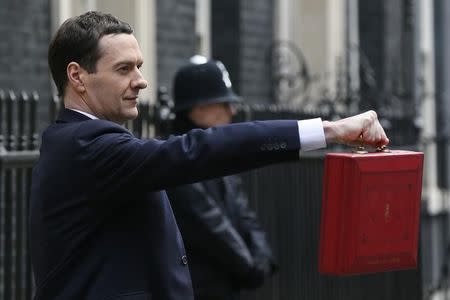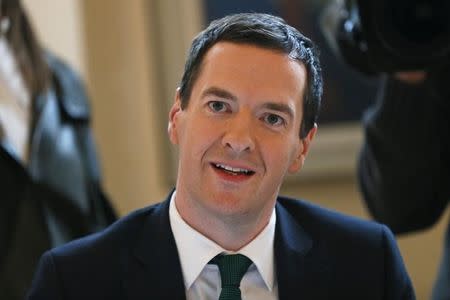Chancellor Osborne woos voters with earlier end to austerity
By William Schomberg and David Milliken LONDON (Reuters) - British Chancellor George Osborne sought to court voters ahead of a tight May 7 election by pitching an earlier end to his austerity drive and cautious tax cuts against a backdrop of faster economic growth. Osborne said Prime Minister David Cameron's government had saved Britain's economy and would bring down national debt earlier than forecast with a 22 billion-pound sale of state-owned bank assets. Osborne aimed to blunt one of the main lines of attack from the opposition Labour Party, which has focused on his previous plans to shrink state spending to a size not seen since before World War Two. He surprised economists by slashing the size of the budget surplus he is aiming for by the end of the decade, assuming his Conservative Party retains power in May. "We took difficult decisions in the teeth of opposition and it worked - Britain is walking tall again," Osborne said. "This is the budget for Britain, the comeback country," he concluded at the end of an hour-long speech, sitting down to roars of support from Conservative Party lawmakers, even if some of their hopes for bigger tax giveaways were disappointed. Osborne also earned a pat on the arm from Cameron, whose central bet since 2010 has been that economic recovery would turn into political gold for the Conservatives and overshadow the pain caused from years of austerity. Seven weeks before an election that opinion polls show is too close to call, the 43-year-old Chancellor of the Exchequer announced modest increases in Britain's expected economic growth in 2015 and 2016. CUTS TO COME Osborne had been handed an unexpected windfall by a plunge in global oil prices and falling inflation. But rather than spend the money on major tax cuts, Osborne sought to nix one of Labour's main lines of attack by cutting the budget surplus target he set as recently as December. The surplus is now projected to be 0.3 percent of economic output in 2019/20, down from the previous forecast of 1 percent. "In effectively looking ahead to the end of austerity, he could well have influenced the nature of the election campaign," Sam Hill, an economist with RBC Capital Markets, said. Osborne is only halfway through the job of fixing the public finances and there will be plenty of cuts to come. Britain's independent budget forecasters said public spending faced a "rollercoaster" ride with much tougher cuts between 2016 and 2018 than over the last five years, followed by a surge in spending at the end of the next parliamentary term. With some of his guns spiked, Labour leader Ed Miliband said Osborne would not be trusted by voters. "This is the budget that can't be believed," Miliband said. "He had an extreme spending plan yesterday and he has an extreme spending plan today." An opinion poll executive said Osborne would shore up his party's support by resisting the temptation to relax his grip on the purse strings now. "It's not going to set the world alight but it's the best thing they could have done for Conservative votes," YouGov research director Anthony Wells said. "He made the right decision in not going with the big tax giveaway." ELECTION BUDGET Despite opting against major pre-election gifts to voters, Osborne did go some way to respond to pressure from within his Conservative Party to bolster their vote on May 7. He announced a cut to beer, cider and spirits duty and cancelled a planned fuel tax increase. In a nod to the concerns among many young people about soaring housing costs, he said the government would help first-time home-buyers by contributing towards their savings for a deposit. And 17 million people would not have to pay tax on their savings under another announcement in his budget, Osborne said. Osborne also promised to raise the point at which people start paying income tax over the next two years, the latest in a string of such tax relief measures by the Conservative-Liberal Democrat coalition since it came to power in 2010. The threshold at which people pay the higher rate of income tax will be raised. Britain's oil and gas industry was given a helping hand to cope with the plunge in oil prices with a series of tax cuts and other support. In an attempt to cement his reputation as the 'austerity Chancellor', he said he would increase a levy on banks and launch the sale of 13 billion pounds of mortgage assets and 9 billion pounds of Lloyds shares. Those sales allowed Osborne to announce that Britain would see its national debt as a share of GDP peak in the current tax year, a year earlier than previously forecast. Critics will say that they are one-off windfalls which will only reduce debt temporarily, not durably. (Additional reporting by Andy Bruce, Kate Holton, Sarah Young, Andrew Osborn, Estelle Shirbon and Neil Maidment; Writing by Guy Faulconbridge; Editing by Tom Heneghan)

 Yahoo News
Yahoo News 



